|
|
|
Sort Order |
|
|
|
Items / Page
|
|
|
|
|
|
|
| Srl | Item |
| 1 |
ID:
130865
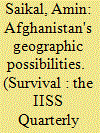

|
|
|
|
|
| Publication |
2014.
|
| Summary/Abstract |
Afghanistan's geostrategic potential is hampered by domestic weakness, regional tensions and major-power competition. Historically, Afghanistan's position at the junction between Asia and Europe has not only made it susceptible to outside invasions and influence, but also rendered it an important conduit for cross-continental interactions. The Greco-Bactrian (250-150 BCE), Kushan (30-375 AD) and Sassanid (224-651 AD) empires derived much of their wealth from the Silk Road, a series of interlinked trading networks criss-crossing the Eurasian land mass and centred around what is now known as Afghanistan. These routes served as the main arteries of east-west trade and transportation, until the disintegration of the Mongol Empire in 1368 AD effectively dismantled the network.
|
|
|
|
|
|
|
|
|
|
|
|
|
|
|
|
| 2 |
ID:
130866


|
|
|
|
|
| Publication |
2014.
|
| Summary/Abstract |
Curbing corruption is vital for China's future. But the exposure of corruption cases can only damage public confidence in the CCP and the state more generally. Corruption associated with toxic food, bogus medicines, grave abuses of power and criminal 'black societies' has produced a series of public scandals in China. Without reform, further occurrences could rapidly erode the legitimacy not just of the police and other judicial organs, but also of the ruling Chinese Communist Party (CCP). The recent trial of Bo Xilai, the former Chongqing party secretary and member of the party's elite 25-member Politburo, showcased the kind of corruption that China's past president Hu Jintao warned could lead to 'the collapse of the Party and the downfall of the state'. In 2011, the Bank of China inadvertently reported that between 1994-2008 as many as 18,000 corrupt officials had fled the country for destinations in Europe, America and other parts of Asia, plundering an estimated $120 billion from state-owned enterprises and other criminal activities. The costs of maintaining domestic public order have also grown rapidly, and, for the first time, domestic security outlays approved by the 2012 National People's Congress (NPC) exceeded defence, in part over concerns about the growth of mass protests, fraud, corruption and organised crime, and the need to strengthen weiwen (stability) and social harmony.
|
|
|
|
|
|
|
|
|
|
|
|
|
|
|
|
| 3 |
ID:
130871
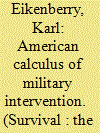

|
|
|
|
|
| Publication |
2014.
|
| Summary/Abstract |
The protracted campaigns in Afghanistan and Iraq have diminished America's appetite for waging wars to end tyranny or internal disorder in foreign lands. Military interventions have traditionally been a source of controversy in the United States. But America's appetite for the dispatch of armed forces has been diminished greatly by factors that have primarily emerged in the twenty-first century. These include, most painfully, the protracted campaigns in Afghanistan and Iraq that have made US political and military leaders more cautious about waging wars to end tyranny or internal disorder in foreign lands.
|
|
|
|
|
|
|
|
|
|
|
|
|
|
|
|
| 4 |
ID:
130868
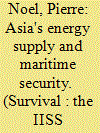

|
|
|
|
|
| Publication |
2014.
|
| Summary/Abstract |
Asia's reliance on international, seaborne energy trade is conducive to strategic cooperation. Whether this will outweigh strategic competition is far from certain. The Asia-Pacific accounts for a large and growing share of the world's energy-demand growth. With imports rising faster than consumption, the region is rapidly becoming the new centre of gravity for global energy markets. Such dynamics have made energy security a key policy concern for Asian states. The naval capacities of these countries are also growing swiftly, prompting some analysts to ask whether an arms race has begun. Although no one would suggest that this build-up of naval power is primarily driven by the need to secure energy supplies, the Chinese and Indian governments have identified energy and resource security as one rationale for developing naval power, particularly blue-water capabilities.
|
|
|
|
|
|
|
|
|
|
|
|
|
|
|
|
| 5 |
ID:
130870
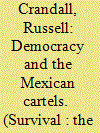

|
|
|
|
|
| Publication |
2014.
|
| Summary/Abstract |
In El Narco, journalist Ioan Grillo provides an overview of the history and dynamics of the Mexican drug war. For years, American and Mexican anti-drug authorities believed that the elusive capo of the Sinaloa Cartel, Joaquín Guzmán, known as 'El Chapo' or 'Shorty', was hiding out in the remote Sierra Madre. But fresh intelligence, apparently gleaned from Guzmán's captured bodyguards, indicated that he had been making clandestine trips to Culiacán, capital of Sinaloa State, and the Northern Pacific resort of Mazatlán. In the early hours of 22 February 2014, ten pickup trucks carrying Mexican marines pulled up at the Mazatlán condominium where Guzmán was believed to be staying. Breaking down its steel-reinforced door, the soldiers found him in bed with his ex-wife, a former beauty queen. Guzmán may have been visiting Mazatlán for only a day or two to see his twin baby daughters, who were also present, before returning to safer confines in the mountains. Although he did tussle with his captors, Guzmán did not attempt to use the machine gun that rested near his bed. No shots were fired in the raid, despite the fact that agents confiscated 97 rifles and machine guns, 36 handguns, two grenade launchers, a rocket launcher and 43 vehicles, many of which were armoured. Having beaten Guzmán and dragged him outside to confirm his identity, the marines transported their prisoner to Mexico City and, finally, a federal detention centre. Shorty had escaped from the high-security Puente Grande Prison in 2001, allegedly in a laundry van, and had been on the run for 13 years. Now that they had him in their hands once more, the Mexican authorities went out of their way to ensure that he would remain in custody.
|
|
|
|
|
|
|
|
|
|
|
|
|
|
|
|
| 6 |
ID:
130862
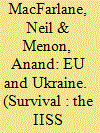

|
|
|
|
|
| Publication |
2014.
|
| Summary/Abstract |
EU members did not take long-standing Russian positions seriously, assumed any neighbour would be eager to sign up for 'more Europe', and have failed to generate a viable reply to Moscow's intervention. Events in Ukraine represent the most significant security crisis in Europe since the collapse of the Soviet Union. The Geneva accord of April this year, intended to secure de-escalation, has been violated by Russia, by 'local' forces in eastern Ukraine and, arguably, by the Ukrainian government itself. Russian Foreign Minister Sergei Lavrov has warned that Russia will defend its interests in eastern Ukraine, if necessary with attacks similar to those in Georgia in 2008. Small US deployments are occurring in the Baltics and Poland. Russia has resumed military exercises near the frontier with Ukraine. The escalatory dynamic is clear.
|
|
|
|
|
|
|
|
|
|
|
|
|
|
|
|
| 7 |
ID:
130859
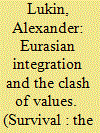

|
|
|
|
|
| Publication |
2014.
|
| Summary/Abstract |
Putin has now established an independent power centre in Eurasia. Although economic considerations are important, they are also secondary to a set of values differing from those preached by the West.
Since the Enlightenment, the driving concepts of Western civilisation have been the belief in its own superiority and the theory of linear progress in human society. According to this understanding, the West (firstly Europe, and later the United States) reached the highest and most advanced level of development, with all other countries moving along the same continuum, although lagging behind and located at various stages of proximity to this ideal.
In fact, many civilisations have considered themselves superior to others. The Ancient Greeks, Romans, medieval Chinese and many others all believed that they had reached the pinnacle of social development. However, the last few centuries of industrial success and military power have reinforced the theory of the West's superiority, with the result that Western notions of progress have long captured the thinking of most of the world.
|
|
|
|
|
|
|
|
|
|
|
|
|
|
|
|
| 8 |
ID:
130867
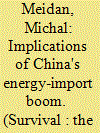

|
|
|
|
|
| Publication |
2014.
|
| Summary/Abstract |
Ensuring access to foreign oil has lost its dominance in Beijing's energy-policy debates. Ensuring access to ever larger quantities of foreign oil has been a focus of debate in China since the late 1990s, when the country's growing oil-import dependence became an inescapable reality. Research institutes and advisers to the Chinese leadership had been preoccupied with identifying the risks associated with China's foreign-oil supplies and devising policies to mitigate them. Yet, as the debate unfolded, it became clear that securing oil supplies was only part of the problem. The overall balance of energy supply and demand, the impact of state-controlled pricing and administrative intervention on the domestic market, and the weakness of institutions governing the energy industry came to be seen as problems that were equally, if not more, pressing. Between 2000 and 2004, a series of events highlighted various aspects of China's energy insecurity and, combined with a change of leadership in Beijing, ultimately led to a shift in energy-policy choices.
|
|
|
|
|
|
|
|
|
|
|
|
|
|
|
|
| 9 |
ID:
130869
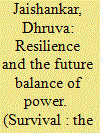

|
|
|
|
|
| Publication |
2014.
|
| Summary/Abstract |
There is more to power than the traditional indicators of resources, influence and perception. Not long ago - in the 1980s, in fact - the US policy community was in the throes of a high-stakes debate about the nature and extent of Soviet power. On one side was a large group who believed that the United States was losing ground to an increasingly powerful and aggressive Soviet Union. Proponents of this view pointed to the shifting balance of conventional military power in favour of Moscow, particularly in Europe, and to Soviet aggression in places such as Afghanistan. As a consequence, many American policymakers advocated increases in military spending to balance against the Soviet Union, a position that was also supported by many in the US military establishment. Others who shared this perspective proposed a more conciliatory and accommodating approach towards their rival, one that was helped along by Soviet leader Mikhail Gorbachev's move towards glasnost, and which was eventually manifested in arms-control talks between Washington and Moscow.
|
|
|
|
|
|
|
|
|
|
|
|
|
|
|
|
| 10 |
ID:
130860
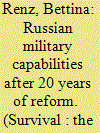

|
|
|
|
|
| Publication |
2014.
|
| Summary/Abstract |
Despite widespread perceptions, Russia is close to having the military it needs. In the aftermath of the Cold War, the leaders of the Russian Federation faced the unenviable task of creating national armed forces using what was left of the Soviet military. Plans to provide 'traditional' defence and to meet future challenges were considered as early as 1992, leading to a string of reform programmes over the next two decades. Such efforts were closely observed by analysts in the West and Russia, who documented the drawn-out process in a large body of literature. The assessments provided in the bulk of these works were almost unanimous: the reforms had failed, leaving the Russian armed forces 'impoverished, demoralized and largely ineffective', 'woefully inadequate to address the country's security threats' and standing 'perilously close to ruin'.
During the presidency of Boris Yeltsin, the reforms were seen as botched jobs that merely reduced troop numbers, essentially leaving Russia with a smaller version of a Soviet-style, mass-conscription army. The latest push for change, announced in the wake of the country's 2008 war with Georgia, during which the performance of the Russian military was widely criticised, met with a warmer reception, at least initially. It envisaged a comprehensive shift away from low-tech to high-tech; from conscription to professionalism; and from mass to mobility. Some structural changes, such as the transition from divisions to brigades and the streamlining of central command, were executed with impressive speed, raising expectations that Russia was finally on its way to acquiring a 'modern' military. As time went on, however, observers noted a range of problems that, in their eyes, dampened the prospect of ultimate success. The Russian defence industry remained unable to produce advanced equipment. The possibility of ending conscription and moving towards an all-volunteer force seemed to be as remote as ever. Moreover, the 2010 military doctrine continued to emphasise mobilisation, instead of focusing on permanent readiness and rapid reaction. When Defence Minister Anatoly Serdyukov was replaced by Sergei Shoigu - a long-standing ally of Russian President Vladimir Putin - in November 2012, some experts argued that the 2008 reforms were in effect 'dead'.
|
|
|
|
|
|
|
|
|
|
|
|
|
|
|
|
| 11 |
ID:
130863


|
|
|
|
|
| Publication |
2014.
|
| Summary/Abstract |
A 'yes' vote, though unlikely, would fundamentally alter the British Isles, and potentially Europe as well. A routine parliamentary afternoon in the United Kingdom: under debate are final amendments to a bill designed to improve advice given to people in debt and to adjust the terms for those who fall into bankruptcy. A government minister, Fergus Ewing, speaks enthusiastically of a financial National Health Service. With matching spirit, his Labour Party opponent, Jenny Marra, attacks some measures as too harsh on bankrupt debtors. A division is called on her proposed amendments, and the number of members in the chamber quickly swells to more than 100 for the votes. The government wins them easily. However, in a remarkable display of consensus politics, the opposition parties, both Labour and the Conservatives, then support the bill, and it is duly passed.
|
|
|
|
|
|
|
|
|
|
|
|
|
|
|
|
| 12 |
ID:
130864
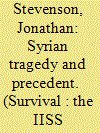

|
|
|
|
|
| Publication |
2014.
|
| Summary/Abstract |
If Washington's Syria policy succeeds, it will crystallise efforts to privilege diplomacy over the use of force and create a precedent other powers will be apt to follow. The United States' present Syria policy is perhaps the most vivid, and discomfiting, example of the Obama administration's realism. Its military forbearance, even in the face of a burgeoning humanitarian crisis (over 150,000 Syrians have died in just over three years) and the Assad regime's use of chemical weapons, has been resolute. Its focus on using diplomacy instead of military power has been firm, if vexing. These traits suggest three strategic clean breaks from the George W. Bush administration's post-9/11 policy. Firstly, they imply recognition by the US that major wars remain possible and cannot be subordinated to 'small wars' of choice. Secondly, they indicate that the counter-insurgency tools developed for expeditionary deployments to Iraq and Afghanistan have been rejected as instruments of policy. Thirdly, they subsume a determined effort at rapprochement with Iran and, more broadly, an approach to Middle Eastern affairs that is substantially less confrontational and heavy-handed.
|
|
|
|
|
|
|
|
|
|
|
|
|
|
|
|
| 13 |
ID:
130861
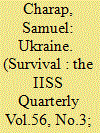

|
|
|
|
|
| Publication |
2014.
|
| Summary/Abstract |
The ugly truth is that Moscow can still undermine any Western plan for Ukraine's future. The crisis is likely to lead to a period of sustained disequilibrium and instability. As Ukraine's winter of domestic discord transformed into a spring of territorial partition and instability, European and American officials seemed to be speaking from an agreed set of talking points in their public remarks on the crisis. While hopeful transatlanticists sought to construe this remarkable consistency as a demonstration of a new seriousness of purpose in the West, the litany of warnings, threats and prescriptions for resolution (inevitably characterised as either an 'off-ramp' or 'de-escalation') spoke more to the desperation of those uttering them to quickly find a new, stable equilibrium for Ukraine, Russia and the international system. Yet the talking points and buzzwords, no matter how many times they are repeated, do not in fact describe either a sustainable equilibrium or an end point to the crisis. Instead, the disequilibrium and instability of the Ukrainian crisis seem likely to endure for some time: the search for a 'new normal' promises to be long, costly and highly disruptive of both individuals' lives and the international order.
|
|
|
|
|
|
|
|
|
|
|
|
|
|
|
|
| 14 |
ID:
130858
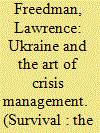

|
|
|
|
|
| Publication |
2014.
|
| Summary/Abstract |
Crisis management is the most demanding form of diplomacy. So far neither Russia nor the US and its European allies have handled it particularly well. Half a century ago, after the conflicts over Berlin and Cuba, a new term of art came into vogue: 'crisis management'. American Secretary of Defense Robert McNamara was even quoted as saying that crisis management had taken over from strategy.1 A small literature came to be devoted to the subject. In a number of respects, the term and the key themes it invoked were behind much of the debate on security policy for the remainder of the Cold War.2
The term 'crisis' comes from a Greek word indicating choice or decision, and came to refer to the turning point in a disease. The crisis was the moment when the fever reached a peak and the patient was either going to get a lot worse or a lot better. It is the moment usually marked in TV dramas by delirious patients, caring nurses, anxious relatives and lots of patting down of sweating foreheads with cold sponges. The idea of an international crisis has the same sense of stress and urgency. It means a conflict has come to a head, normally because one side has taken a bold but provocative initiative. At the moment of crisis, some big, long-standing conflict is about to be resolved, either through last-minute diplomacy or by force. The drama comes from a deadline, perhaps reinforced by an ultimatum, and intense media attention. On the news channels, the moment is usually marked by late nights in the corridors of power, emergency summits and tense United Nations Security Council meetings, while staying on the alert for military mobilisations and movements. Leaders of major powers would be expected to show that they had the temperament and character for a crisis. A steely resolve and calm judgement would be at a premium. This was the point of Hillary Clinton's famous challenge to candidate Barack Obama in 2008 as to how he would cope when 'it's 3 a.m. and your children are safe and asleep. But there's a phone in the White House and its ringing. Something's happening in the world.
|
|
|
|
|
|
|
|
|
|
|
|
|
|
|
|
|
|
|
|
|